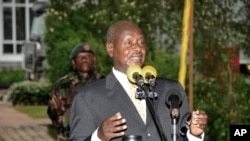KAMPALA - Ugandan President Yoweri Museveni attacked both the opposition and the media in his State of the Nation address on Thursday, while taking credit for improvements in Uganda’s economy and advocating for more science-based industry.
The Ugandan president had nothing but scathing remarks for his political opponents during his address, delivered in the capital, Kampala, at the opening of the second session of parliament.
With most Ugandans concerned about the country’s double-digit inflation and soaring unemployment, Museveni focused his speech on the economy. But he included an attack on opposition leader Kizza Besigye, whose demonstrations over the past year - watched closely by police - have turned violent more often than not.
The president accused Besigye of misrepresenting Uganda and its problems, and, in so doing, scaring away tourism dollars.
“Besigye’s lawlessness added to the problem of the relative scarcity of the dollars; hence the loss of value of the Uganda shilling," he said. "It should be sacrilege to have political actors who tell lies about the destiny of the Ugandan people. I congratulate the police for defeating this conspiracy by Dr. Besigye of attempting to overthrow the constitution by insurrection.”
Museveni also used the occasion to advocate for the controversial Public Order Management Bill being debated in parliament, a bill widely criticized by human rights groups for drastically curtailing freedom of assembly and expression.
The Ugandan president attacked the media as well, calling it unprofessional, hinting that if Ugandan media continue reporting the way they do, the government could withdraw their licenses.
“The media is also a corrupt, irresponsible and unprofessional group," he said. "It is the duty of every media house, radio, TV or newspaper to ensure that they give balanced and objective coverage of any story. Any media house that does not do it will lose out. I will show you how if they continue. The power of licensing belongs to the state.”
On economic matters, Museveni claimed credit for his party, the National Resistance Movement, for improving Uganda’s economy during the 26 years he has been in office.
But he also said that the sectors growing fastest in Uganda - small businesses such as hair salons and taxis - are not the ones the country needs to boost employment and exports. He emphasized the need for transport infrastructure, factories, and, in particular, more investment in the science and medical fields.
“The only public servants that deserve pay rise are the scientists, because they contribute decisively to the economy, and their contribution is unique," said Museveni. "A teacher can be dismissed, and we get another one. But a doctor - if a doctor is not there, you cannot replace him easily.”
Museveni promised that once the country's new-found oil begins to flow, conditions would improve for everyone. But that may be little comfort to Ugandans impatient for concrete solutions to the country’s most pressing economic problems.
The Ugandan president had nothing but scathing remarks for his political opponents during his address, delivered in the capital, Kampala, at the opening of the second session of parliament.
With most Ugandans concerned about the country’s double-digit inflation and soaring unemployment, Museveni focused his speech on the economy. But he included an attack on opposition leader Kizza Besigye, whose demonstrations over the past year - watched closely by police - have turned violent more often than not.
The president accused Besigye of misrepresenting Uganda and its problems, and, in so doing, scaring away tourism dollars.
“Besigye’s lawlessness added to the problem of the relative scarcity of the dollars; hence the loss of value of the Uganda shilling," he said. "It should be sacrilege to have political actors who tell lies about the destiny of the Ugandan people. I congratulate the police for defeating this conspiracy by Dr. Besigye of attempting to overthrow the constitution by insurrection.”
Museveni also used the occasion to advocate for the controversial Public Order Management Bill being debated in parliament, a bill widely criticized by human rights groups for drastically curtailing freedom of assembly and expression.
The Ugandan president attacked the media as well, calling it unprofessional, hinting that if Ugandan media continue reporting the way they do, the government could withdraw their licenses.
“The media is also a corrupt, irresponsible and unprofessional group," he said. "It is the duty of every media house, radio, TV or newspaper to ensure that they give balanced and objective coverage of any story. Any media house that does not do it will lose out. I will show you how if they continue. The power of licensing belongs to the state.”
On economic matters, Museveni claimed credit for his party, the National Resistance Movement, for improving Uganda’s economy during the 26 years he has been in office.
But he also said that the sectors growing fastest in Uganda - small businesses such as hair salons and taxis - are not the ones the country needs to boost employment and exports. He emphasized the need for transport infrastructure, factories, and, in particular, more investment in the science and medical fields.
“The only public servants that deserve pay rise are the scientists, because they contribute decisively to the economy, and their contribution is unique," said Museveni. "A teacher can be dismissed, and we get another one. But a doctor - if a doctor is not there, you cannot replace him easily.”
Museveni promised that once the country's new-found oil begins to flow, conditions would improve for everyone. But that may be little comfort to Ugandans impatient for concrete solutions to the country’s most pressing economic problems.












